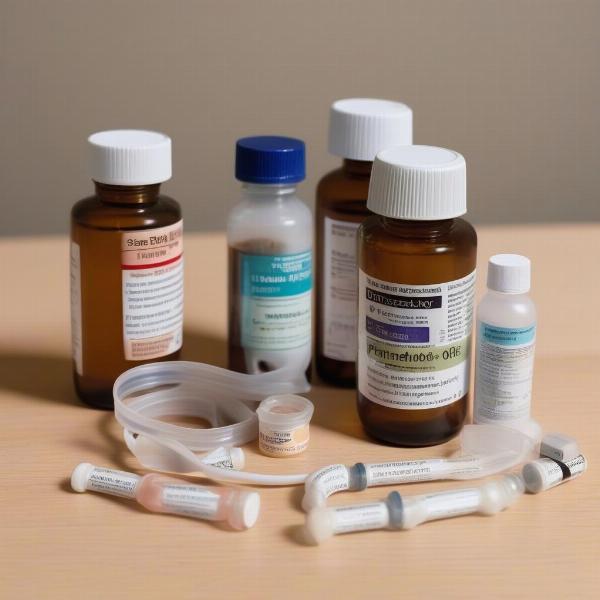Hookworms in dogs are a serious concern, but thankfully, they are treatable. These tiny parasites latch onto your dog’s intestinal wall, feeding on their blood and causing a range of health problems. Knowing how to cure hookworms in dogs involves accurate diagnosis and appropriate veterinary treatment, combined with preventative measures to protect your pet from reinfection. This article provides a comprehensive guide on identifying, treating, and preventing hookworms in your canine companion.
Recognizing the Signs of Hookworms in Dogs
Hookworm infections can present with various symptoms, and the severity depends on the dog’s age, overall health, and the worm burden. Puppies are especially vulnerable, often showing signs like anemia, stunted growth, and even death in severe cases. Recognizing these signs is crucial for early intervention:
- Pale gums
- Weakness and lethargy
- Diarrhea, sometimes bloody
- Loss of appetite
- Weight loss despite a normal appetite
- Coughing (due to larval migration through the lungs)
- Itchy paws (larvae can penetrate the skin)
If you notice any of these signs, consult a veterinarian immediately. They will conduct a fecal examination to confirm the presence of hookworm eggs and determine the appropriate treatment plan.
Veterinarian-Prescribed Medications for Hookworms
Treating hookworms in dogs requires medication prescribed by a veterinarian. These medications, called anthelmintics, work by killing the adult worms in the intestine. Several effective options are available, including:
- Fenbendazole: A common and effective treatment often administered for several days.
- Pyrantel pamoate: Another frequently used anthelmintic, available in various forms, including tablets and liquids.
- Milbemycin oxime: A broad-spectrum parasiticide that also protects against heartworms and other intestinal parasites.
Your veterinarian will determine the most appropriate medication and dosage based on your dog’s individual needs and the severity of the infection.
 Medication options for hookworm in dogs
Medication options for hookworm in dogs
Preventing Hookworm Reinfection
Treating hookworms is only half the battle. Preventing reinfection is equally important to protect your dog’s long-term health. Here are some essential preventative measures:
- Regular deworming: Follow your veterinarian’s recommended deworming schedule to prevent hookworm infestations.
- Proper fecal disposal: Clean up your dog’s feces immediately and thoroughly to minimize environmental contamination.
- Environmental hygiene: Regularly disinfect areas where your dog spends time, especially kennels and yards.
- Preventing exposure to contaminated areas: Avoid areas known to be contaminated with hookworm larvae, such as dog parks with poor sanitation.
What if My Dog Still Has Hookworms After Treatment?
Sometimes, a single treatment course isn’t enough to eliminate all hookworms. If your dog still shows symptoms or if a follow-up fecal exam reveals persistent hookworm eggs, your veterinarian may recommend a second round of treatment. This is often necessary to target any newly hatched larvae that weren’t affected by the initial medication.
Conclusion
Curing hookworms in dogs requires prompt veterinary attention and a commitment to preventative measures. By recognizing the signs, seeking appropriate treatment, and implementing preventative strategies, you can protect your furry friend from these harmful parasites and ensure their continued health and well-being.
FAQ
- How do dogs get hookworms? Dogs can contract hookworms through ingestion of larvae, skin penetration, or through their mother’s milk.
- Are hookworms contagious to humans? Yes, hookworms can be transmitted to humans, usually through skin contact with contaminated soil.
- How often should I deworm my dog for hookworms? Consult your veterinarian for a tailored deworming schedule, typically every few months.
- Can hookworms be fatal to dogs? Yes, especially in puppies, severe hookworm infections can lead to life-threatening anemia.
- What are the long-term effects of hookworms in dogs? Untreated hookworm infections can cause chronic anemia, malnutrition, and developmental problems in puppies.
- How can I tell if my dog has hookworms? Look for signs like pale gums, lethargy, diarrhea, weight loss, and itchy paws. A fecal exam by a veterinarian is necessary for diagnosis.
- Can I treat my dog for hookworms without going to the vet? No, always consult a veterinarian for proper diagnosis and treatment. Over-the-counter dewormers may not be effective against all types of hookworms.
ILM Dog is your trusted source for expert advice on dog care, offering valuable insights into breeds, health, training, nutrition, and more. We’re committed to providing practical, evidence-based information to help you nurture a happy and healthy canine companion. Contact us at [email protected] or +44 20-3965-8624 for any inquiries. Visit ILM Dog for more information and resources.